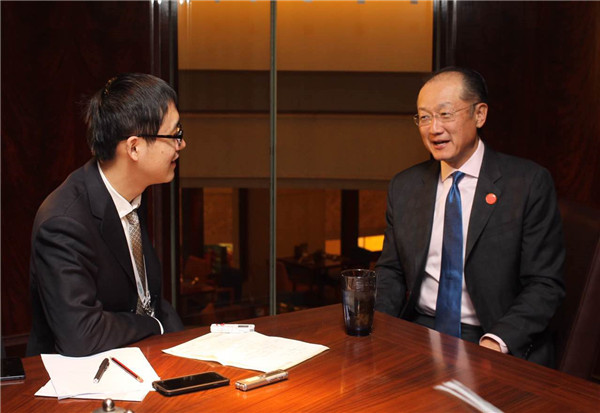 |
|
World Bank President Jim Yong Kim (right) talks about the Chinese economy with China Daily reporter Zheng Yangpeng on Friday in Shanghai.GAO ERQIANG/CHINA DAILY |
World Bank chief: Beijing's fiscal and monetary policy transparency is bolstering confidence
China has realized the critical importance of communication and the world is going to see more transparency and clarity about China's decision-making, the World Bank president told China Daily on the sidelines of the G20 meeting.
"I met Premier Li Keqiang on Wednesday, and he told me they had realized the importance of communication. A lot of suspicion is that things are happening, but the global community is not sure why things are being done. ... The fact that you tell what exactly your intention is, in terms of fiscal policy, monetary policy, status of structural reform, that kind of communication will go a long way to dispel the doubts," World Bank President Jim Yong Kim said.
Such communication is critically important on the exchange rate issue, he said, an issue that grabbed the world's attention during the meeting. Kim cited People's Bank of China's Governor Zhou Xiaochuan's recent communication as showing China's progress.
"The biggest issue about the renminbi is people fear they don't know how decisions are being made. Now Governor Zhou is coming out and saying they are looking at a basket of currencies and making decisions based on the yuan's relation with a basket of currencies,
"China is on a very good path. Governor Zhou is communicating, he is even communicating in English, which I think is really important. What you are going to see is more transparency," he said.
The importance of communication also applies to the Chinese economy.
"Chinese leaders have said they are going to move away from a strategy based on investment and export to consumption and service. That's happening. China is engaging in reforms in the financial sector, hukou (household registration) system and healthcare sector," Kim said.
"We are working with them on these reforms. We are right here on the ground to work with China, so we are much more optimistic about what's happening here than some observers from outside," he said.
However, Kim said it is critical for China to "maintain the momentum of structural reform". The second issue is to keep communicating, and more frequently and broadly.
He disclosed that throughout half of his meeting with Li, the premier discussied how to foster China's new economic drivers.
"This is his top priority. He wants to think about all the different ways that China could grow in the future," he said.
Kim said the World Bank is pleased that Li has trusted it to do a third report on policy recommendations on China, about the country's healthcare reform. The bank previously undertook two studies with a Chinese think tank on China's 2030 growth strategy, and urbanization. Both stimulated wide debate and made an impact.
Commenting on its cooperation with the Asian Infrastructure Investment Bank, Kim said the World Bank will co-finance with the AIIB. But beyond specific projects, what he sees as most important is China's embrace of "multilateralism".
"When you have multilateral institutions as your premise, and you are trying to ensure all countries work together," he said, adding the world expects more China's leadership.
